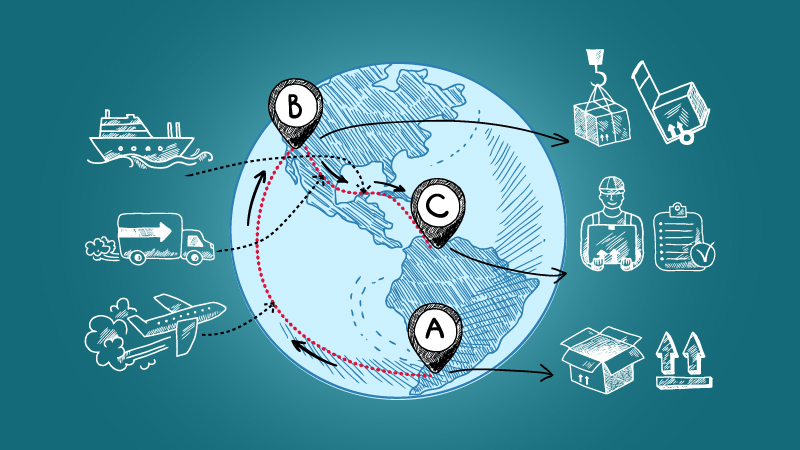Blockchain In Supply Chain Sustainability: Promoting Ethical Practices

The global supply chain is a complex network of interconnected systems, and its intricate web often faces challenges related to ethical practices and environmental sustainability. However, a revolutionary technology is emerging to address these concerns: blockchain. Blockchain, a distributed ledger technology, has the potential to transform how businesses operate by fostering transparency, accountability, and traceability within their supply chains. This article delves into the vital role blockchain plays in promoting ethical practices and enhancing sustainability throughout the supply chain.
Introduction

The demand for ethically sourced and sustainably produced products is rising, driven by consumer awareness and growing regulatory pressure. Yet, traditional supply chains struggle to meet these demands due to opaque processes, lack of traceability, and limited information sharing. This is where blockchain comes in. By enabling secure and immutable record-keeping, blockchain technology can enhance transparency and accountability, thereby paving the way for more ethical and sustainable supply chains.
Transparency and Traceability
Blockchain’s core principle of transparency fosters trust and accountability within the supply chain. Each transaction is recorded and encrypted on a decentralized ledger, making it accessible to all authorized participants. This transparency allows consumers, businesses, and regulators to track the origin, journey, and transformation of goods throughout the supply chain.
- Real-time Tracking: Blockchain enables real-time tracking of products, providing complete visibility into their movements and conditions. This visibility helps identify bottlenecks, optimize routes, and ensure timely delivery.
- Provenance Verification: With immutable records, blockchain offers a secure and reliable platform for verifying the provenance of goods. Consumers can trace the origin of products back to their source, confirming their authenticity and ethical sourcing.
- Supply Chain Auditability: Blockchain facilitates comprehensive supply chain audits by providing a verifiable record of all transactions and events. This transparency allows for independent verification of ethical practices and compliance with regulations.
- Reduced Counterfeiting: Blockchain’s tamper-proof nature makes it an effective tool for combating counterfeiting. By establishing a secure and auditable system, blockchain helps protect brands and ensure product authenticity.
Ethical Sourcing and Labor Practices
Blockchain can play a pivotal role in promoting ethical sourcing and improving labor conditions within the supply chain. By enabling the tracking of raw materials and products, blockchain provides a clear picture of the origin and journey of goods. This transparency helps businesses ensure that their suppliers adhere to ethical sourcing standards and uphold labor rights.
- Fair Trade and Sustainable Practices: Blockchain facilitates the creation of fair trade networks, allowing consumers to identify and support businesses committed to ethical sourcing. This traceability helps ensure that farmers and producers receive fair compensation for their products.
- Worker Welfare Tracking: Blockchain can monitor working conditions and ensure compliance with labor standards. By recording information about workers’ wages, working hours, and safety practices, blockchain provides a verifiable record that helps safeguard workers’ rights.
- Conflict-Free Sourcing: Blockchain can help trace the origin of materials and products to ensure they are not sourced from conflict zones. This transparency helps prevent the exploitation of resources and the funding of armed conflicts.
- Supply Chain Risk Mitigation: Blockchain can identify and mitigate risks related to unethical labor practices and forced labor. By providing a verifiable record of transactions, blockchain helps businesses make informed decisions and ensure ethical sourcing.
Environmental Sustainability
Blockchain technology can contribute significantly to environmental sustainability by enabling more responsible and efficient supply chain operations. It facilitates the tracking of environmental impacts associated with production, transportation, and consumption, promoting sustainable practices and reducing waste.
- Carbon Footprint Tracking: Blockchain can track the carbon footprint of products throughout their lifecycle. This data helps businesses identify areas for improvement and implement strategies for reducing their environmental impact.
- Sustainable Packaging and Waste Management: Blockchain can enhance transparency and traceability in packaging and waste management systems. By tracking the origin and lifecycle of packaging materials, businesses can optimize their use and promote sustainable practices.
- Circular Economy Integration: Blockchain can facilitate the development of circular economy models by enabling the tracking and management of recycled materials and products. This transparency promotes responsible resource utilization and reduces waste.
- Environmental Compliance Monitoring: Blockchain can help monitor compliance with environmental regulations by recording and verifying data on pollution levels, emissions, and resource consumption. This transparency ensures accountability and encourages responsible environmental practices.
Reduced Costs and Improved Efficiency
While often associated with transparency and ethics, blockchain also brings significant cost savings and efficiency improvements to supply chains.
- Streamlined Processes: Blockchain automates and simplifies many manual processes, reducing administrative overhead and streamlining operations. This efficiency leads to faster processing times and reduced error rates.
- Reduced Fraud and Waste: Blockchain’s tamper-proof nature minimizes the risk of fraud and counterfeiting, reducing losses and improving overall efficiency.
- Improved Inventory Management: Blockchain enables real-time inventory tracking, optimizing stock levels, and reducing storage costs. This visibility helps prevent overstocking and stockouts, improving overall supply chain efficiency.
- Enhanced Collaboration: Blockchain facilitates seamless information sharing and collaboration among stakeholders. This enhanced communication fosters transparency and trust, leading to better decision-making and improved efficiency.
Conclusion
Blockchain technology is rapidly transforming the global supply chain, offering a powerful tool for promoting ethical practices and enhancing sustainability. By providing a transparent and auditable platform for tracking goods, managing data, and verifying transactions, blockchain empowers businesses to operate more responsibly and sustainably. As the technology matures and adoption grows, it is expected to have a profound impact on the future of supply chain management, driving positive changes across industries and empowering consumers to make more informed purchasing decisions.
The benefits of blockchain extend beyond mere transparency and traceability. Its ability to streamline processes, reduce costs, and enhance efficiency makes it a compelling solution for businesses seeking to optimize their supply chains. Moreover, blockchain’s potential to address ethical concerns related to labor practices and environmental sustainability positions it as a critical enabler of a more just and sustainable future.
However, it is crucial to acknowledge that blockchain adoption presents challenges. The technical complexity of the technology, the need for widespread collaboration, and the lack of standardized protocols require careful consideration and strategic planning for successful implementation. Despite these challenges, the potential of blockchain to transform the supply chain for the better is undeniable. By embracing this transformative technology, businesses can contribute to a more ethical and sustainable future while achieving significant operational efficiencies and cost savings.